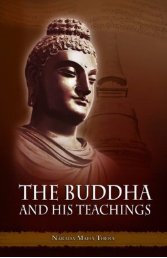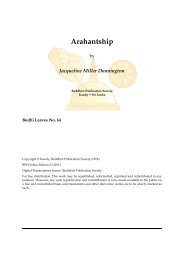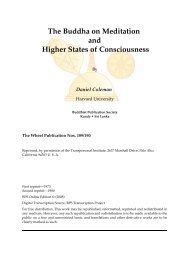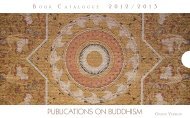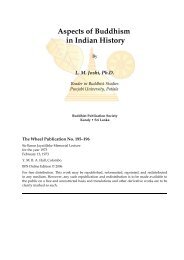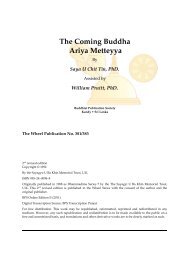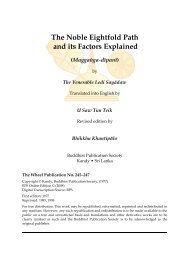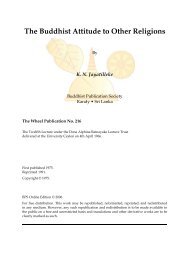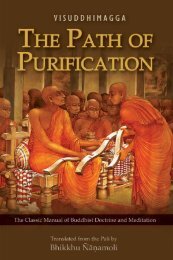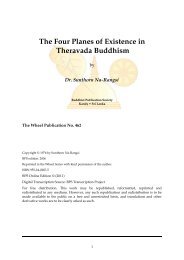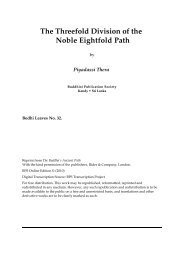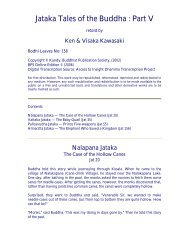Buddhism and Comparative Religion and Other Essays - Buddhist ...
Buddhism and Comparative Religion and Other Essays - Buddhist ...
Buddhism and Comparative Religion and Other Essays - Buddhist ...
Create successful ePaper yourself
Turn your PDF publications into a flip-book with our unique Google optimized e-Paper software.
The Influence of <strong>Buddhist</strong> Philosophy 6On the occasion of the two previous meetings of our Symposium, the Contribution of <strong>Buddhism</strong>to Art <strong>and</strong> Letters was dealt with. We proceed now to our discussion on <strong>Buddhism</strong>’sContribution to Philosophy. Making use of a simile employed by Ān<strong>and</strong>avardhana on poetry Imay say this: Art is the beautiful corporeal frame of <strong>Buddhism</strong>, literature is its prāṇa or lifebreath,philosophy is its mind; so that the topic of our deliberation is, as it were, a task ofpenetrating gradually more <strong>and</strong> more into the depth of the inner core of the great spiritualmovement which has given so much to the world.I feel deeply honoured by having been asked to preside over this session. I take it as adistinction not so much for my own humble endeavours to fathom the profundity of <strong>Buddhist</strong>philosophy but as an award of honour bestowed upon my country, because especially inGermany, philosophers have for a long time shown great interest in <strong>Buddhism</strong>.The first Germans who had heard the name of the Buddha were probably theologians whohad read the works of St. Hieronymus, one of the fathers of the Christian Church. For, this saintmentions the miraculous birth of the Buddha. But of Buddha’s doctrine, nobody seems to havehad any detailed knowledge during the Middle Ages. It was not until the 17 th century that aGerman philosopher obtained some knowledge of <strong>Buddhism</strong>. It was Gottfried Wilhelm Leibniz(1646–1716) who took a very keen interest in China, whose philosophy had just been madeknown to Europe by the works of French Jesuits. Leibniz drew from their books some points ofthe <strong>Buddhist</strong> doctrine as taught in the Chinese Empire. In his most famous book, the Theodiceehe speaks of Fo, as the Chinese call the Buddha, <strong>and</strong> refers to the Madhyamika-System <strong>and</strong> itsdoctrine of Emptiness.A wider range of knowledge we find with Immanuel Kant (1724–1806). It is not much knownthat Kant at the University of Königsberg delivered not only lectures on Philosophy but also onGeography. Without ever having left his native town he had acquired a considerable knowledgeof all the parts of the globe by reading books on travel. He therefore in his lectures speaks about<strong>Buddhism</strong> in Ceylon, Burma, Siam, in China, Japan <strong>and</strong> Tibet. He draws a very sympatheticpicture of the <strong>Buddhist</strong> monks in Burma. He says, “The Talapoins of Pegu are praised as theworld’s kindliest men. They live on the food which they beg at the houses <strong>and</strong> give to the poorwhat they do not need for themselves. They do good to all living beings without making anydiscrimination on the grounds of religion. They think that all religions are good which makemen good <strong>and</strong> amiable.”Kant already knew that <strong>Buddhist</strong>s do not believe in a creator <strong>and</strong> ruler of the universe whojudges men after death, for he writes; “They reject the idea of divine providence, but they teachthat vices are punished <strong>and</strong> virtues are recompensed by a fatal necessity.” Kant did not yetknow anything about the <strong>Buddhist</strong> doctrine of Kamma <strong>and</strong> Rebirth, <strong>and</strong> his philosophy has inno way been influenced by <strong>Buddhist</strong> ideas. But the doctrine of metempsychosis appealed to himin several periods of his life. Even shortly before his death, when asked by his friend Hasseabout the future of the individual after death, Kant expressed himself in favour of the doctrineof transmigration. On another occasion he called it one of the most attractive teachings ofOriental philosophy. He himself taught a pre-existence of the soul before man is born <strong>and</strong> he6Presidential Address delivered at the Fifth Session on “<strong>Buddhism</strong>’s Contribution to Philosophy” of theSymposium on “<strong>Buddhism</strong>’s Contribution to Art, Letters <strong>and</strong> Philosophy” arranged from November 26 thto 29 th , 1956, in New Delhi, by the Working Committee for the 2,500 th Buddha Jayanti, Government ofIndia, in collaboration with the UNESCO, to commemorate the 2,500 th Anniversary of the Parinirvāna ofthe Buddha. Reprinted from The Mahā Bodhi, Vaisakha Number 1957.7



